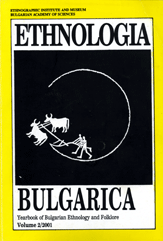Образи на половете в българското село през ХХ в. – между традиционното и модерното
Gender Images in the Bulgarian 20th Century Village: Between Tradition and Modernity
Author(s): Ana LulevaSubject(s): Anthropology
Published by: Институт за етнология и фолклористика с Етнографски музей при БАН
Summary/Abstract: The article treats the problem of tradition and modernity in the Bulgarian family and the associated social order and ideology, viewed through the prism of gender. Against the background of autobiographical stories and official discourse under socialism (1944-1989) the images of gender stand out as sets of conceptions about gender, built in the processes of interactions; images reflected in which are social values, operating norms and gender roles. This approach has been based on the understanding about gender as socially designed and, consequently, historically changeable, tied up with the social processes. The first part of the article dwells on the traditional patriarchal spirit. Serving as a premise is the thesis that the type of family, the family residence and the positions and roles of the marital partners associated with them have been determining for the female and male identity. The gender images are built in the family whereby kinship has dominant importance. In view of the great importance of the home element, the woman and the man build on it their prestige and achieves social recognition. In the second part, the attention is focused on the socialist modernity and the problem of how the tensions between the state and party, striving to govern private life and resistance “from below”, shape relations between the sexes, the family roles and gender images. Socialism attacks the patriarchal spirit in the public discourse and reaffirms it in the social practices. Despite the change in the social roles, the conceptions about manliness and femininity reproduce the patriarchal symbolic order. The idea of freedom and equality of women in the socialist society failed to materialise not because everything was done“on the top” (on the part of the state and its institutions), but “the old models” proved to be an obstacle. This happened because the idea/ideological principle itself of socialist equality contains a hierarchical, unequal treatment of women and men, veiling of the difference existing between them, striving for their instrumentalisation for the sake of “loftier” goals. The utopian attempt at modelling “the new man” failed also because of the profound antipathy that formal rhetoric aroused among the common folk; for them it had turned into a synonym of hypocrisy and lying.
Journal: Българска етнология
- Issue Year: 2001
- Issue No: 2
- Page Range: 26-39
- Page Count: 14
- Language: Bulgarian

